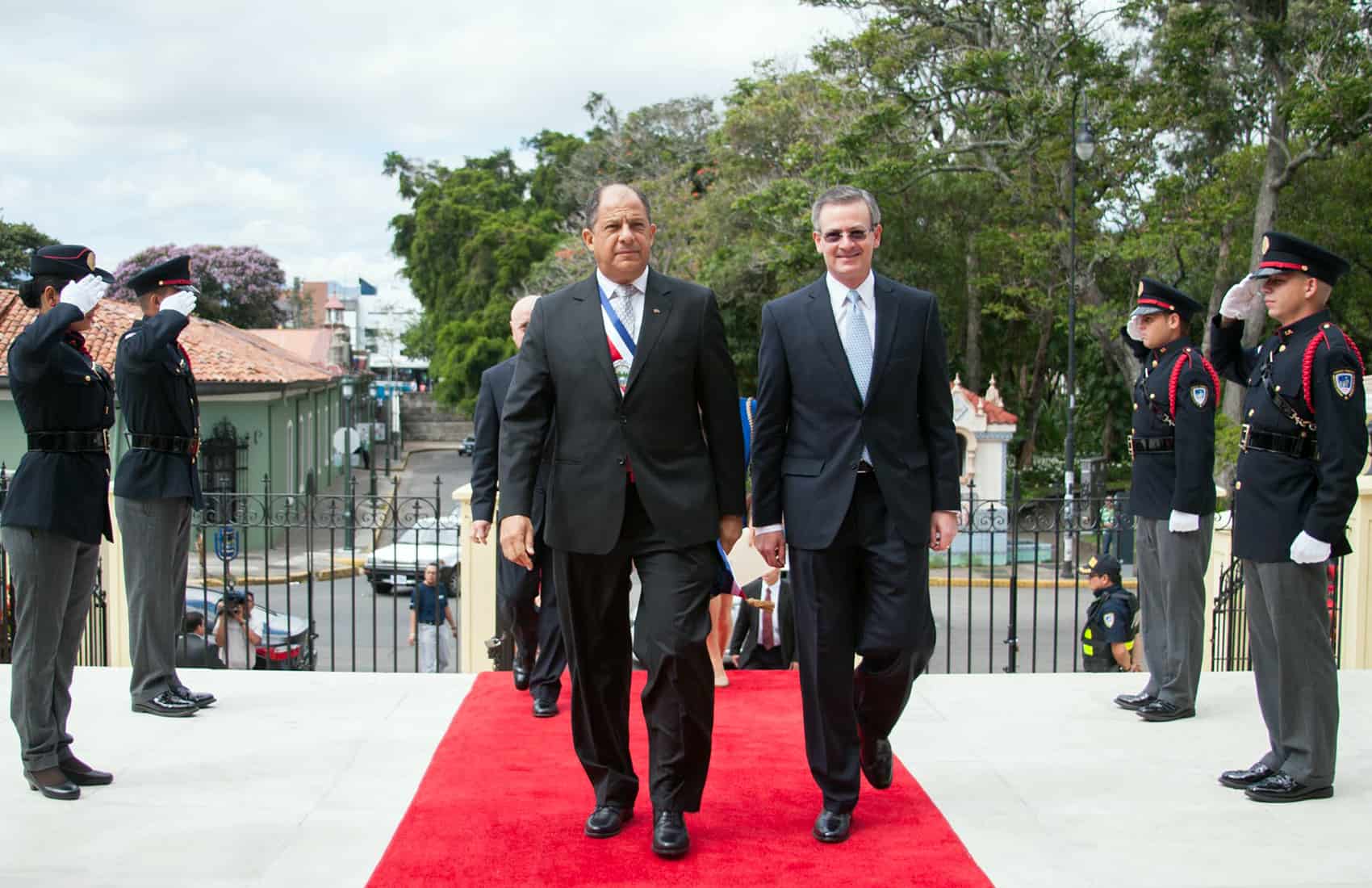Costa Rica’s government confirmed Tuesday that President Luis Guillermo Solís’ trip to Cuba next week will include a mission of 31 officials and 50 representatives from the business sector.
Casa Presidencial disclosed the details of the mission and the full list of officials who will join Solís on his visit designed to improve relations with the Caribbean nation. A statement from Casa Presidencial said the cost to taxpayers for airline tickets is estimated at ₡14.3 million, or just over $27,000.
The list of officials who will travel Dec. 13-15 with expenses covered includes first lady Mercedes Peñas, as well as various ministers, lawmakers, advisers and journalists. Casa Presidencial said the university rectors and business executives would pay their own way.
The announcement has drawn criticism, mostly at the Legislative Assembly, where opposition lawmakers harshly criticized the president’s decision to pay travel expenses for most of the group, after Solís’ promises to cut public spending.
The National Liberation Party’s Rolando González said there is no consistency between Solís’ calls for spending cuts and the actions of his administration. González described the president’s trip as “political tourism from Casa Presidencial” and accused Solís of reneging on the austerity promises he made before he was elected.
Mario Redondo from the Christian Democratic Alliance called Solís’ trip a shameful act and said it was nothing but “one of the gifts of the government’s Christmas party.”
Criticism also came from former President Abel Pacheco (2002-2006), who told the daily La Nación that an official mission of more than 30 people “is not a visit, it’s an invasion of a country.”
Pacheco said he does not understand why Solís is traveling with such a large group of entrepreneurs “when Costa Rica has no interest in investing in Cuba and most Cubans do not have a cent to invest in another country.”
Administration defends Solís trip to Cuba
Foreign Minister Manuel González defended the trip, saying Tuesday the mission has not only diplomatic goals, but also seeks to open the doors for future negotiations in other areas such as health, business, technology, tourism, sports and education.
The government’s mission includes first lady Mercedes Peñas and her personal journalist, Foreign Trade Promotion Office General Manager Pedro Beirute, Foreign Minister Manuel González, Health Minister Fernando Llorca, Science and Technology Minister Marcelo Jenkins, Tourism Minister Mauricio Ventura and Sports Minister Carolina Mauri.
The president also invited lawmakers Nidia Jiménez from the ruling Citizen Action Party, Martha Arauz from the National Liberation Party, José Alberto Alfaro of the Libertarian Movement Party, Jorge Arguedas of the Broad Front Party and Abelino Esquivel of the Costa Rican Renovation Party.
He also extended the invitation to presidents of the National University, National Technical University and the University of Costa Rica.
The president’s support staff includes Solís’ personal assistant Verónica Fernández, press director Stephanie González, health services director César Gamboa, chief of staff of the Costa Rican Tourism Board Roberto Arce, international cooperation coordinator at the Science and Technology Ministry Eliana Ulate, as well as Casa Presidencial’s staff journalists, a cameraman and a photographer.
The director of intelligence and security, Mariano Figueres Olsen, and the director of the presidential security group, Francisco Paniagua, also are part of the group.
Business mission
The business group includes 50 entrepreneurs representing 23 of the country’s productive sectors. They will seek to negotiate the removal of current restrictions on payment procedures for selling goods and services, and in transportation of products to Cuba.
Foreign Trade Minister Alexander Mora said he has received complaints from companies doing business with Cuba that they frequently face problems in receiving payment due to a series of requirements that must be met by people trying to send money from the island.
Mora said that before seeking business opportunities, the Solís administration will ask Cuban officials to set clear rules on payment requirements and procedures.
The trade mission also wants to discuss changes that could occur with trade agreements following the reactivation of diplomatic relations between Cuba and the U.S.






